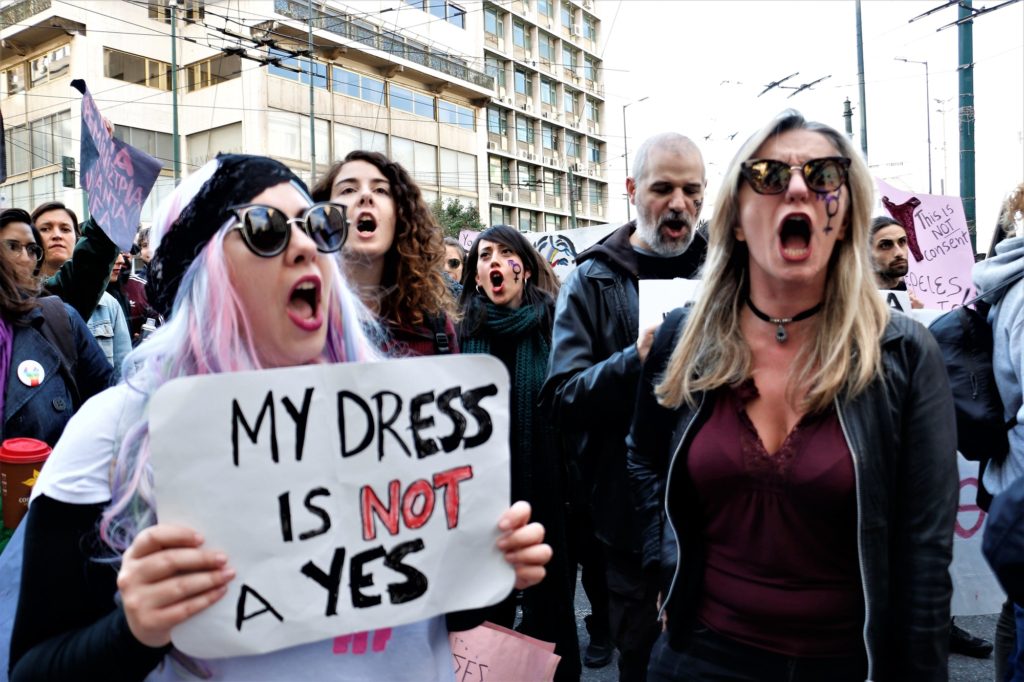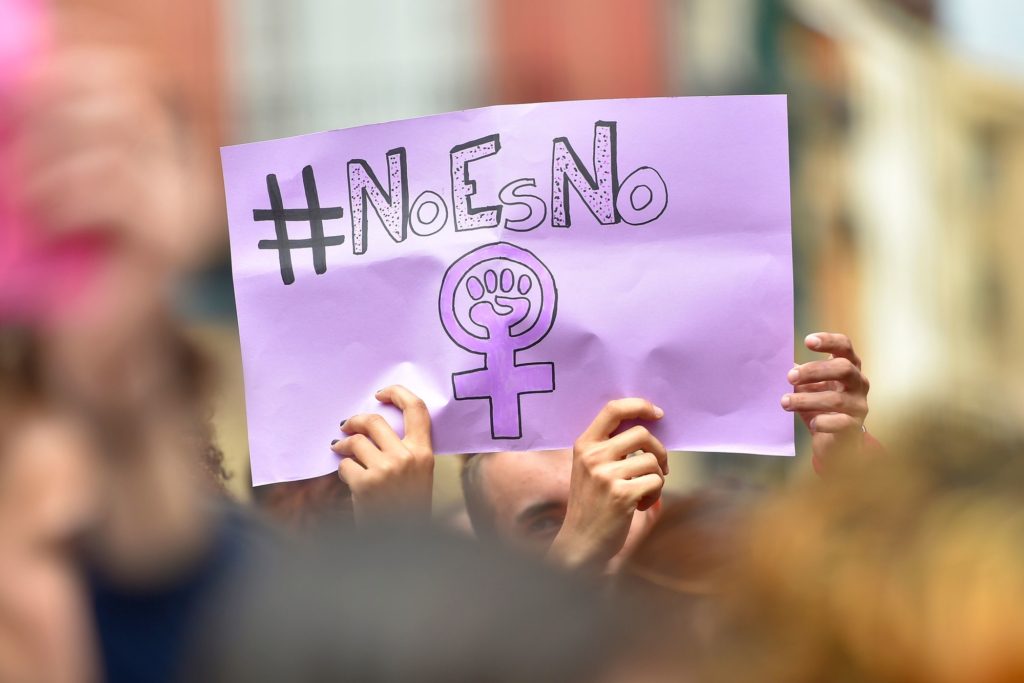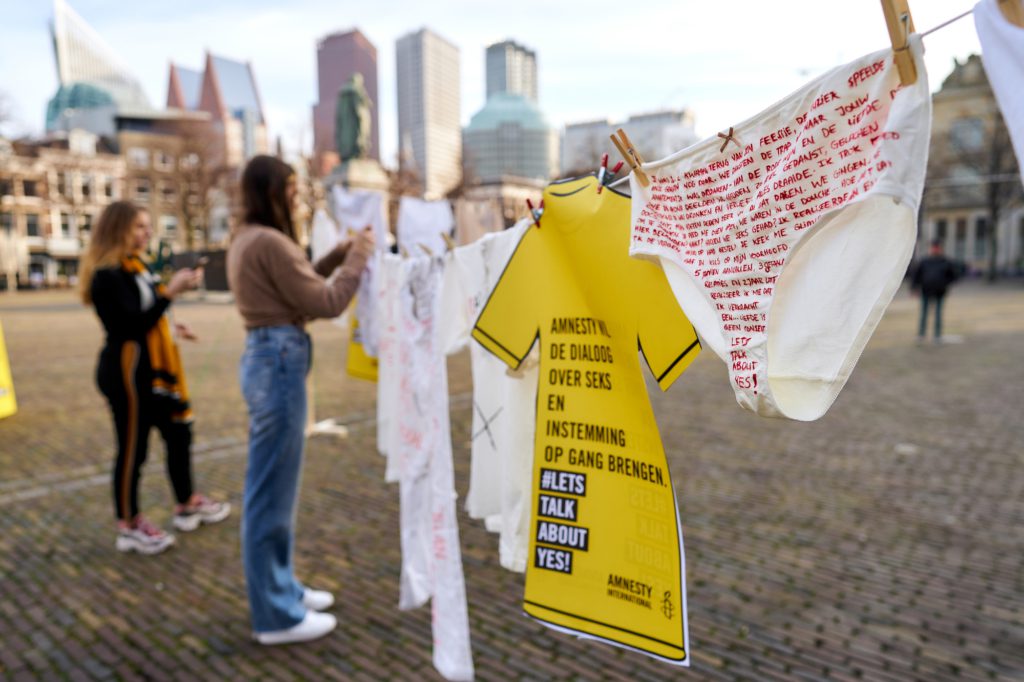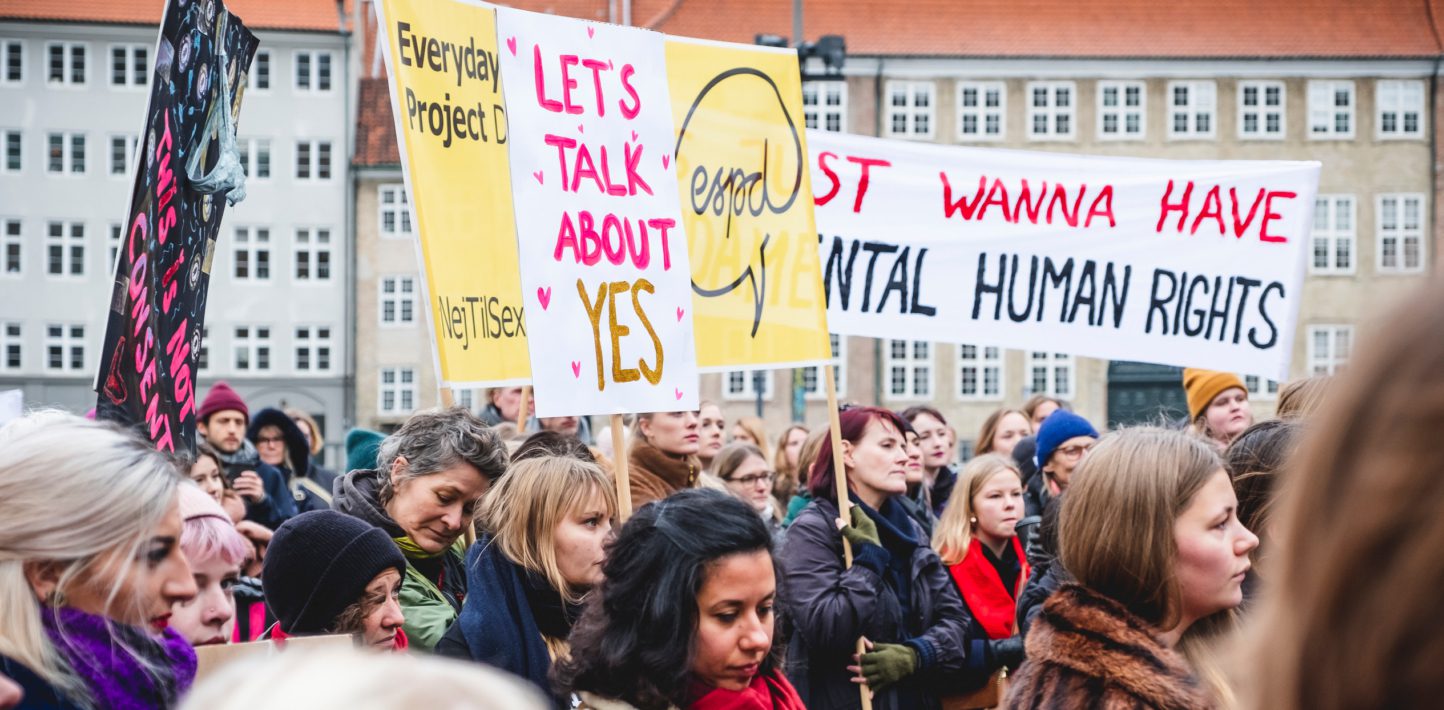Sex without consent is rape. It’s that straightforward – there are no “grey” areas.
It’s still rape if the victim is under the influence of drink or drugs; or has decided to go home with someone; or is wearing revealing clothes. And it’s still rape if the victim has not said “no” clearly or fought back.
Yet only 18 European countries out of the 31 analysed by Amnesty International have laws that define rape as sex without consent: Belgium, Croatia, Cyprus, Czech Republic, Denmark, Finland, Germany, Greece, Iceland, Ireland, Luxembourg, Malta, Netherlands, Spain, Slovenia, Sweden, Switzerland and the UK.

In a great number of European countries, for a crime to be considered rape, the law still requires coercion, the use of force or threats of force to have been used – or the inability to defend oneself. But most rapes do not fit stereotypes such as a ‘stranger jumping out of the bushes’. Rather women and girls are often raped by a friend or partner, or have a shock reaction and freeze, so often there is no physical violence involved.
Thanks, however, to the brave women, survivors and their allies who have been courageously sharing their experiences and campaigning for change, attitudes – and laws – are changing across Europe. Finland, Spain and Switzerland are some of the latest countries in Europe to adopt legislation defining rape by the absence of consent, following Slovenia in 2021 and Denmark in 2020.
Amnesty International has supported campaigners and activists across Europe, playing its part in putting pressure on governments to introduce reforms. In Greece, Amnesty had a direct influence on the final nail-biting outcome of the law reform by ongoing advocacy and campaigning efforts up until the last minute and issuing a statement strongly condemning the government’s initially problematic stance. This caught the media’s attention, and the consequent pressure put on the government by Amnesty International working alongside women’s rights campaigners led ministers to amend the law to change the definition of rape from July 2019.

Other countries such as The Netherlands have now reformed their outdated laws to become consent-based.
Here we look at some European countries where, thanks to determined campaigning frequently lead and propelled by survivors themselves, laws on rape have changed for the better over the last five years:
Denmark
On 17 December 2020, after many years of campaigning by women’s rights and survivors’ groups, supported along the way by Amnesty International, the Danish parliament finally passed legislation to recognize that sex without consent is rape. The bill was possible after a cross party agreement to amend the Criminal Code in September.
The new law to introduce consent-based rape legislation is a historic victory for human rights in the country, where Amnesty International has pushed for change. A report by Amnesty released in 2019 details the barriers faced by women in Denmark accessing justice for rape.
We are confident that, led by survivors, Denmark can take the next step to live up to its image of a gender equal country and inspire other countries in Europe to follow
Anna Blus
Amnesty International’s Women’s Rights Researcher, Anna Błuś, says campaigners have fought for this moment for years. The law reform which aims at ensuring that everyone’s sexual autonomy is respected and protected in Denmark is a huge achievement of rape survivors, activists, women and human rights organisations.
“The change of the law is a massive positive step that will have to be accompanied by institutional and social change, as well as comprehensive sexuality and relationships education, including on sexual consent. We are confident that, led by survivors, Denmark can take the next step to live up to its image of a gender equal country and inspire other countries in Europe to follow,” she said.
Sweden
In 2013, Sweden was shaken by a court’s decision to acquit three young men accused of raping a 15-year-old girl with a wine bottle until she bled. The judge’s final verdict included the shocking phrase: “People involved in sexual activities do things naturally to each other’s body in a spontaneous way, without asking for consent.”
The ruling sparked the formation of a new national movement called FATTA (“Get It”), which set out to make the law recognize the simple fact that sex without consent is rape. Five years on, in May 2018, and buoyed by the global #MeToo movement led by people around the world, the campaign achieved its goal. New legislation was passed in the Swedish Parliament by an overwhelming majority.
Almost two years after the law came into force, the Swedish authorities published the results of an evaluation about its implementation, involving all cases reported, prosecuted and tried in 2019. The new law criminalises intercourse and comparable sexual acts with someone who does not voluntarily participate and has resulted in a significant increase in convictions and to a lesser degree, in prosecutions in cases that two years ago were not considered rape in law. These include situations in which the victim ‘freezes’ or is taken by surprise and does not have time to react. This is an encouraging development that eventually should contribute to greater access to justice for many survivors.
Greece

In June 2019, Greece became the ninth country in Europe to recognise the simple truth in law that sex without consent is rape after a dramatic about-turn by the Ministry of Justice.
After intense months of campaigning by Amnesty International and women’s groups, the Ministry of Justice announced a proposal in June 2019 to amend the Penal Code including the definition of rape. However, the initial proposed change was not compatible with international human rights law and not in line with the campaigners’ calls.
Amnesty International escalated its advocacy initiatives and also issued a strong statement condemning the proposal, whilst women’s organisations simultaneously mobilised to set up a protest outside Parliament, also criticising the outset proposal in the media. Amnesty’s statement and the women’s outrage was picked up by international media, spreading the message further.
The following day, the Minister of Justice did a U-turn and amended the proposed reform, so that sex without consent was criminalized as rape. Parliament voted to change the definition of rape in law with the new legislation came into effect in July 2019.
Spain

In Spain, the government announced in 2019 that it intended to change the law to recognize sex without consent as rape, in response to widespread protests in the aftermath of a high-profile gang rape case in which the justice system failed the survivors. Amnesty International has been campaigning on this issue alongside women’s rights activists here as well.
In the highly publicised case of La Manada (Wolfpack), five men accused of rape were found guilty of the lesser offence of sexual abuse as the first instance court in its opinion did not find evidence of violence or intimidation. While a higher court disagreed with this finding and convicted the men of rape, the case sparked protests and exposed the inadequacy of Spanish criminal law, which currently does not consider sex without consent as rape if physical violence or intimidation are not present.
At the beginning of March 2020, Spain finally announced a new bill on comprehensive responses to sexual violence, including reforming the legal definition of rape to bring it into line with international human rights law and focus on consent. The bill was finally passed in Parliament in August 2022. It was hailed as a victory for survivors of rape and for the countless women, campaigners and activists who pushed for reforms in law, policy and practice through their protests and street actions.
The Netherlands

In November 2020, that Dutch Minister of Justice and Security announced the intention of the government to amend Dutch rape legislation. Under the previous law, if there was no evidence of coercion, the offence is not considered rape.
The announcement of the minister responded to public criticism, including from Amnesty International to an initial proposal to introduce a new criminal offence: ‘sexual intercourse against a person’s will’, punishable by half the sentence for rape. The concrete wording of the reform will be published in the new year.
In October 2022, a long-waited bill was finally sent to the House of Representatives (parliament). The bill criminalizes all forms of involuntary sex as rape, not only where there is a verbal ‘no’, but when lack of will is apparent from the observable facts and circumstances.
On March 19, 2024, the Senate voted on the bill. The bill was passed by 73 votes to 2. This is an important step in the fight against sexual violence, and for victims. The new consent based law will enter into force on the 1st of July 2024.
The importance of changing rape laws
Changing laws will not eradicate rape, but it is a crucial step along the way. It sends a powerful message about what kind of society we want to live in. That is, a society free from rape, and where everyone’s sexual autonomy and bodily integrity are respected and valued.
Reforming the law can be a fundamental starting point for changing behaviours and attitudes, but it must also be accompanied by concerted efforts to challenge widespread harmful rape myths and gender stereotypes.
By changing the laws and ensuring the end of victim blaming and gender stereotypes in legal proceedings, European governments can ensure that future generations never question whether sex without consent is rape, and never doubt that the perpetrators will be punished.


